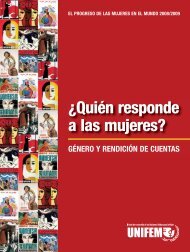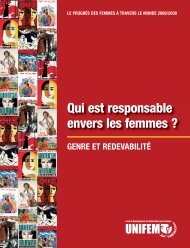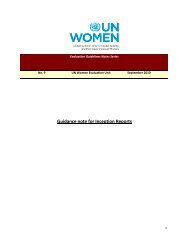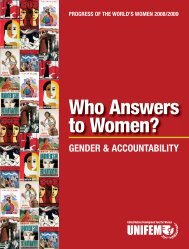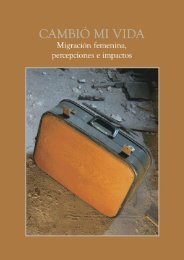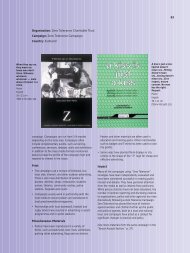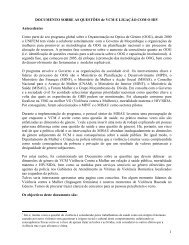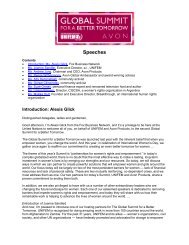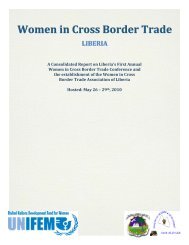W omen Building Peace and Preventing Sexual Violence - UN Women
W omen Building Peace and Preventing Sexual Violence - UN Women
W omen Building Peace and Preventing Sexual Violence - UN Women
Create successful ePaper yourself
Turn your PDF publications into a flip-book with our unique Google optimized e-Paper software.
16<br />
GBV crimes. In response to this obstacle, the<br />
Gacaca law was revised in 2004, so that victims<br />
of sexual crimes can present their case in front<br />
of one judge, rather than the entire community;<br />
it remains to be seen to what extent this provision<br />
is implemented in practice. 23 In addition,<br />
while w<strong>omen</strong> comprise the majority of witnesses<br />
for other types of genocide-related crimes, the<br />
obligation to testify can be a source of tension.<br />
For example, if a woman’s husb<strong>and</strong> committed<br />
a crime during the genocide, the wife may be<br />
exposed to strong pressure from her in-laws not<br />
to testify. This pressure is often compounded by<br />
the fact that in many cases w<strong>omen</strong> are dependent<br />
on their husb<strong>and</strong>’s family for economic sup-<br />
port. 24<br />
Community-based<br />
legal support<br />
In many cases, the reason for impunity for violent<br />
crimes against w<strong>omen</strong> is not a lack of laws that<br />
address SGBV, but rather the failure to implement<br />
those laws. The failure of implementation<br />
W<strong>omen</strong>’s group in northern Ug<strong>and</strong>a. Their village is the<br />
site of a massacre that killed many community <strong>and</strong> family<br />
members. (Photo: Annalise Moser/<strong>UN</strong>IFEM)<br />
is linked to barriers such as legal institutions’ resistance<br />
to prosecuting SGBV cases <strong>and</strong> lack of<br />
knowledge about legal rights.<br />
A particularly innovative approach to address<br />
these issues is that of the American Refugee<br />
Committee (ARC) Legal Aid Programme in<br />
Guinea, which operates a legal aid clinic. 25 The<br />
clinic runs an education programme targeting<br />
refugees, community leaders, government <strong>and</strong><br />
non-governmental aid workers, as well as United<br />
Nations employees, physical <strong>and</strong> mental health<br />
care providers, bar owners, hotel owners, video<br />
club owners, law enforcement personnel <strong>and</strong><br />
Guinean officials charged with the responsibility<br />
to protect. The programme disseminates information<br />
about the clinic’s services, the substance<br />
of the laws regarding SGBV <strong>and</strong> the penalties<br />
associated with violation of these laws. The programme<br />
also strives to educate refugees on their<br />
rights while aiming to deter would-be offenders.<br />
Among the services provided by the clinic are<br />
legal advice <strong>and</strong> representation to survivors of<br />
violence, which enables:<br />
» Punishment of those who engage in criminal<br />
activities;<br />
» Protection <strong>and</strong> restitution for survivors;<br />
» Deterrence of others who might engage in<br />
similar acts; <strong>and</strong><br />
» A visible, reliable <strong>and</strong> effective avenue of recourse<br />
for w<strong>omen</strong>.<br />
By filing cases, the clinic promotes the enforcement<br />
<strong>and</strong> rule of law within the Guinean legal system.



